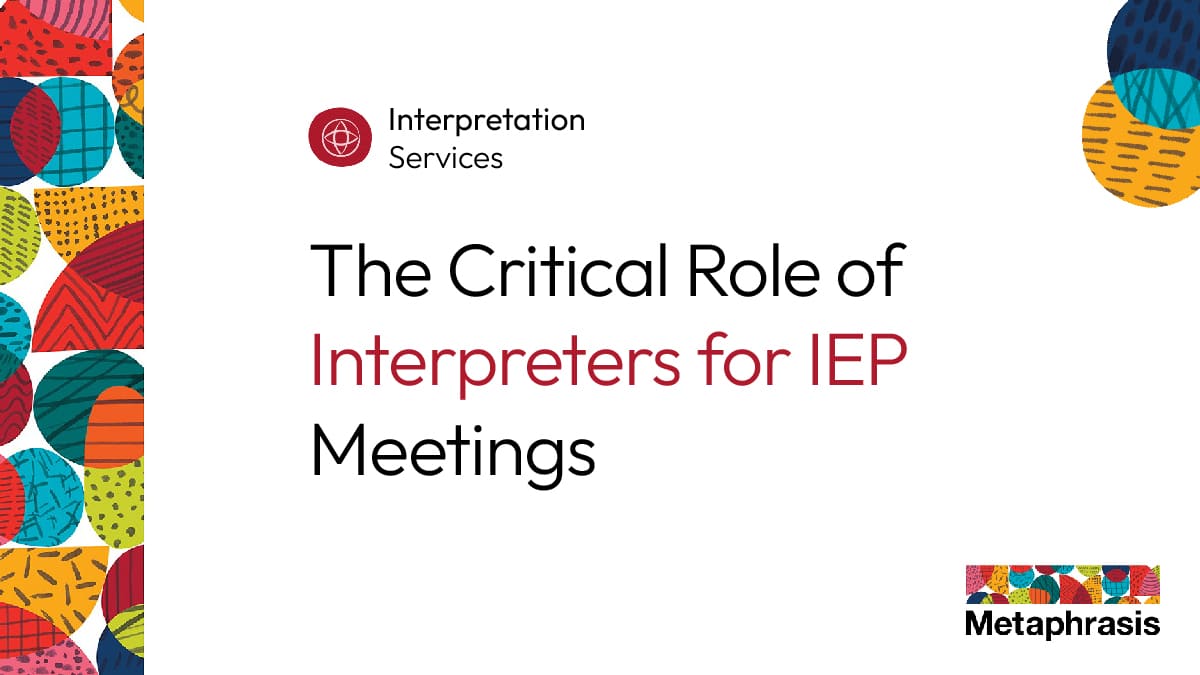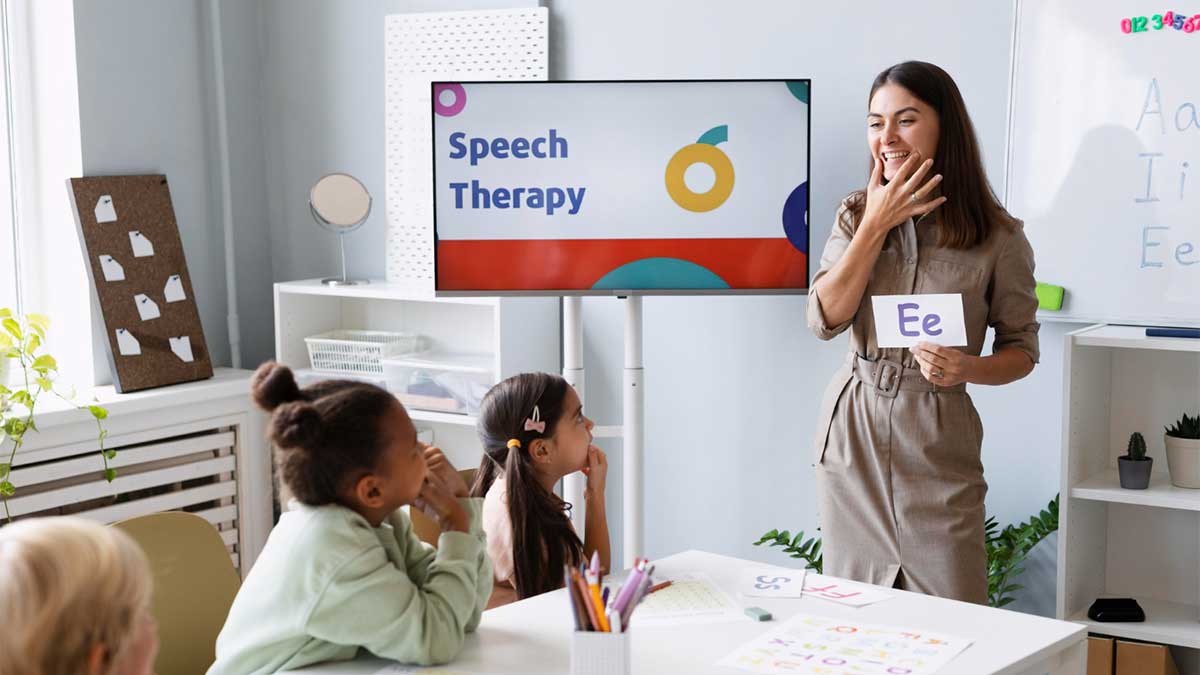
The Role of Translators in Supporting Multilingual Families during IEP Meetings
The heart of special education lies not only in identifying and nurturing the potential of children with diverse learning needs, but also in fostering a collaborative environment where every parent has an opportunity to participate in their child’s academic journey. Ensuring that classrooms, schools, and the overall learning environment are truly inclusive means recognizing linguistic diversity and the crucial role of interpreters for IEP meetings.
According to federal education data, roughly 1 in 10 students who qualify for special education in the United States identify as English learners. This underscores the requirement for public, charter, and private schools alike to embrace translation of IEPs and interpretation for IEP meetings.
Interpreters for IEP meetings play a vital role in a school’s ability to support the diverse needs of families and engage with parents.

What is an IEP?
An IEP is an educational road map for children with disabilities. Required by the federal Individuals with Disabilities Education Act (IDEA), an IEP is a regularly updated document that outlines goals and milestones for students based on their unique abilities. IEPs are created by a team including teachers, parents, school administrators, other school staff such as psychologists, and sometimes the students themselves.
In the U.S., about 13% of students have IEPs. Students with IEPs can have hearing impairment, vision impairment, autism, intellectual disabilities, orthopedic impairments, brain injuries, speech or language impairments, or other disabilities that require specialized help with school.
Speaking English as a second language does not qualify a student for an IEP. However, English Language Learners may have disabilities that necessitate an IEP.

What is a 504 Plan?
A “504 plan” refers to Section 504 of the U.S. Rehabilitation Act of 1973, which states that any organization, including a school, that receives federal money cannot discriminate against people with disabilities.
For schools, this can mean that students with learning disabilities can get extra time to take tests or finish homework, sit near the front of the classroom, or use textbooks in formats they can understand, such as audiobooks or Braille and large-print books. A team of teachers, specialists, and parents determines what accommodations a student receives under their 504 plan.
In general, the goal of a 504 plan is to accommodate students with disabilities in general education classrooms. About 1.5% of U.S. students have 504 plans, according to the Department of Education’s Office of Civil Rights.
What’s the Difference Between an IEP and a 504 Plan?
A 504 plan is geared toward ensuring a student has equitable access to a learning environment. An IEP focuses on educational benefits and often includes direct services such as speech or occupational therapy. Both are free. Some students have both, and some just have one or the other.
504 plans are typically available to students with a broader range of disabilities, including attention deficit disorders. IEPs are available to students with one of 13 specific criteria such as orthopedic impairments or intellectual disabilities.
Enhancing Parental Engagement for Improved Student Outcomes
Providing interpretation for IEP meetings isn’t just a nice to have – it is a right protected by federal law. Under the Individuals with Disabilities Education Act (IDEA), and Title VI of the Civil Rights Act, the provision of interpreters is mandated for Limited English Proficient (LEP) parents. Beyond compliance, providing interpreters for IEP meetings helps build respectful and authentic relationships between schools and parents – providing parents with confidence in the school’s commitment to their child and empowering them to actively participate in the educational process for their child.
Clear communication is the cornerstone of any meaningful interaction, especially when discussing complex issues such as special education. The terminology and processes associated with IEPs can be particularly difficult to comprehend for speakers of any language. That’s why working with a professional translation and interpretation service, like Metaphrasis, helps schools to facilitate more impactful IEP meetings and ensures the parents fully understand the discussion and recommendations being made.
Working with professional interpreters allows every parent to feel heard, respected, and empowered – leading to higher levels of engagement and trust, ultimately resulting in improved student outcomes.

Virtual Interpretation Increases Language Access
Interpretation services have become more accessible in today’s virtual landscape. Further, since the pandemic, teachers and parents alike are more comfortable with and used to working via Zoom and other virtual platforms. Through virtual platforms, interpreters for IEP meetings are accessible from anywhere, overcoming lack of availability of a local resource or availability to support a last-minute need.
Virtual interpretation services allow schools to access a wide network of interpreters on demand, with lower or no hourly minimums and no travel fees. Metaphrasis interpreters for IEP meetings are available on-demand via video through our web portal or app, or via phone through any phone – landline or cell phone Or, interpreters can join an IEP meeting via Zoom, Teams, Google Meet, or any other online meeting platform when scheduled in advance. Metaphrasis works to make the interpreter scheduling process seamless and easy for schools.

Choosing an IEP Translation and Interpretation Service for Your School
Metaphrasis understands that IEP interpretation and translation leads to greater student success. We partner with schools for the translation of IEP documents and the interpretation of IEP meetings. With a focus on education, and specifically special education, Metaphrasis translators and interpreters are well-versed in the language of IEPs. Making it easy for schools to request and collaborate with qualified linguists; We empowers schools to demonstrate their commitment to collaboration with LEP parents while fulfilling their obligation to provide language support.
Our linguists understand the language and terminology for IEPs, along with:
- graduation requirements
- workforce readiness
- report cards
- curriculum and Common Core
With nearly 100 languages available for IEP interpretation and translation, Metaphrasis makes the process easy without rush fees or project management costs.
Request a quote today to see if Metaphrasis can help your school or district.
